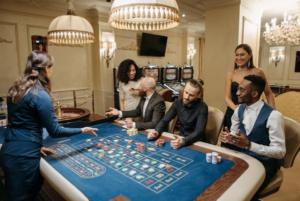In the competitive poker world, psychological savvy often separates the winners from the rest. Understanding the subtle interplay of mind games enables players to gain a crucial edge. This aspect of poker goes beyond mere card strategy; it delves into the art of deception, player dynamics, and self-control.
A keen grasp of psychology helps decipher opponents’ tells and manage one’s demeanor to mislead and manipulate. Successful players use these insights to make informed decisions, turning the psychological battlefield to their advantage.
Our exploration into the top psychological tips aims to arm you with strategies that elevate your poker game beyond the conventional, tapping into the mental prowess required for victory.
Reading Your Opponents
It’s not simply about noticing a twitch or a glance; it’s about weaving a narrative from the patterns of behavior, betting habits, and the unspoken dialogue exchanged across the table. This skill transforms the game, allowing players to preempt opponents’ moves and adjust their strategies accordingly.
Players can deduce their likely holdings, weaknesses, and even bluffing tendencies by observing competitors’ reactions. Such insights offer a significant advantage, enabling strategic bets and bluffs tailored to exploit specific vulnerabilities.
Cultivating this ability demands patience, sharp observation, and an understanding of human psychology, elevating one’s game from the mechanical to the psychological, where actual poker battles are won.
Projecting a Confident Image
In a game where perception can dictate action, the ability to convey strength, even when uncertain, can sway opponents’ decisions in your favor. This psychological maneuver requires mastery over one’s emotions and the skill to display an aura of unshakable confidence.
A player who exudes confidence forces others to second-guess their strategies, potentially leading them to fold winning hands or hesitate in their aggression. The key lies in the subtleties—maintaining steady eye contact, controlling involuntary tells, and making decisive moves.
To dominate in poker, it’s not enough to rely on deception alone. Pursuing a strong image is also about instilling doubt in others and turning the psychological aspect of the game into a powerful weapon, just as potent as the cards in hand.
The Power of Position
The power of position grants a player unparalleled insight into the actions of their opponents, offering a strategic vantage point from which to make more informed decisions. Being in a late position, such as the dealer spot, allows players to observe how others act before committing themselves, turning this knowledge into a formidable advantage.

This strategic edge enables savvy players to control the pace and direction of the game. Utilizing one’s position can be a powerful tool to apply pressure strategically, bluff more effectively, and even save bets in seemingly unfavorable situations.
Managing Tilt
Tilt, the emotional frustration that can follow losses or bad beats, often leads players to make irrational decisions, deviating from strategic play. Recognizing the onset of tilt is the first step in mitigating its effects. It requires a high level of self-awareness and the ability to remain emotionally detached from the immediate outcomes of the game.
Strategies for managing tilt include taking breaks to regain composure, setting strict loss limits, and practicing mindfulness or stress-reduction techniques away from the table. Successful players understand that poker is a marathon, not a sprint.
Players who can maintain a clear head and remain focused on their decision-making processes, rather than being swayed by short-term results, can effectively minimize the impact of tilt and protect their bankroll and psychological well-being in the fiercely competitive poker world.
The Bluffing Balance
Mastering the bluffing balance is a fine art in poker, crucial for keeping opponents off-balance and unsure. It’s about judiciously choosing when to employ this tactic to maximize its impact. Overbluffing can lead to predictability, while underbluffing might cause you to miss valuable opportunities to win pots.
The essence of a well-executed bluff lies in understanding your opponents’ perceptions and tendencies. Identifying the perfect moments to bluff involves analyzing patterns and reactions and should be used selectively to create a strategic image for future hands.
Bluffing, therefore, becomes a tool not just for winning a single pot but for shaping the dynamics of the entire game.
Adaptability And Reading the Table
Success in this game is about fluidly adjusting your approach based on the unfolding dynamics at the table. This level of adaptability demands a keen observation of opponents’ behaviors, betting patterns, and the game’s overall mood.
Being able to read the table effectively allows a player to anticipate shifts in momentum and exploit opportunities as they arise. It involves deciphering the subtle cues that indicate changes in other players’ strategies or confidence levels.
To apply these skills effectively in an online setting, players often seek platforms that offer a fair and competitive environment. If you are looking for information about certain platforms, an honest review can be invaluable. For example, considering a Bodog poker honest review can help players understand how the site supports adaptability and strategic play.
Psychological Endurance
Psychological endurance is the bedrock of any poker player’s arsenal, especially in tournaments and long sessions where mental fatigue can become as much an opponent as the players across the table. This stamina allows players to maintain focus, discipline, and strategic clarity under pressure, ensuring that decisions are based on logic rather than emotion.

Players must engage in regular self-reflection, stress management, and continuous learning to cultivate psychological endurance. Recognizing the signs of mental fatigue and having strategies to counteract them is crucial.
Having high psychological endurance is crucial to stabilizing the game’s highs and lows, making players formidable opponents over the long haul. Techniques like deep breathing, taking breaks, and shifting focus help maintain mental sharpness.
Conclusion
In conclusion, mastering poker extends beyond the cards in hand; it’s a comprehensive engagement with psychological strategies and emotional intelligence. The insights provided on reading opponents, projecting confidence, leveraging position, managing tilt, balancing bluffs, adapting to table dynamics, and cultivating psychological endurance are foundational to transcending average play.
Embrace these principles as part of a holistic approach to poker. With dedication and mindful application, players can elevate their game to new heights, making every decision count in the intricate dance of this timeless game.















